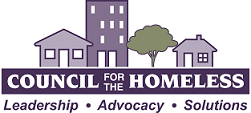 By Kate Budd, Executive Director,
By Kate Budd, Executive Director,
Council for the Homeless
The year 2020 was one like no other. Before COVID, I would never have believed someone if they told me restaurants and theaters were going to shut down, and everyone was going to be wearing masks. Or that people living on the streets across the nation were going to be housed in motels in order to have a home in which to “stay home and stay healthy.” And yet these things and many more surprising realities occurred.
During COVID our community showed time and time again that all people deserve to have a healthy home to live in. The many organizations that united to address homelessness stepped up to identify more safe housing options during 2020 than were available in 2019 — a tremendous community response to this problem.
I also want to recognize those who are living on the streets in Clark County. While local businesses, communities and households experienced major COVID outbreaks, those living on the streets did not. When I talked to people living in encampments and in their cars, they took the threat of COVID very seriously, stayed in their pods, and stayed away from others. They shared that it’s been a particularly difficult year because, as Sherree put it, “There’s been very few places for us to relieve ourselves, people are scared of coming in contact with anyone, and everything is shut down.”
The COVID crisis has also shone a bright light on the ongoing harm BIPOC communities have experienced as a result of systemic racism and oppression. The effects of COVID have only heightened this harm. Systems, including our local homeless crisis response system, must be more transparent. Disaggregating data by race and ethnicity is vital to identifying and addressing past and future systemic and structural racism. See the document, A Brief Timeline of Race and Homelessness in America, which provides a detailed history of the harm caused and perpetuated by systemic oppression, discrimination and racism. The Clark County Annualized Homelessness Equity Dashboard, is another way we seek to share information and address harm.
You can view and download the 2020 Homeless Crisis Response System Numbers Report at https://www.councilforthehomeless.org/annual-system-data/.
Community members and the media are invited to a webinar on April 20, 2021 hosted by Council for the Homeless, to explore and discuss the 2020 System Numbers Report. Go to https://www.councilforthehomeless.org/community-education for details. There is no charge to attend.
